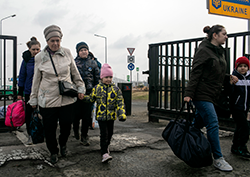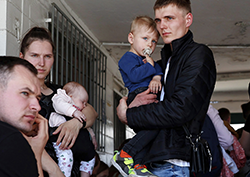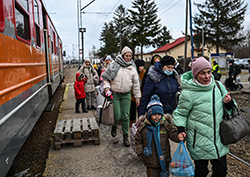HIAS Briefing Call on U.S. Refugee Resettlement - July 27, 2016
Aug 08, 2016
The United States has a proud tradition of offering welcome and safety to refugees from around the world, allowing those who have fled persecution and violence to start new lives in safety and freedom.
With more displaced people than ever before, people are asking questions about what the U.S can do to help, and also wanting to learn more about how resettlement to a third country, like the United States, actually works.
To help answer these questions, HIAS held a briefing call on July 27 for those interested in learning more about the refugee resettlement process.
“There’s a tremendous amount of misinformation out there about how the process works and the people that it helps,” Rabbi Jennie Rosenn said during the call.
Amy Weiss, resettlement director for Jewish Family and Children’s Services, HIAS’ resettlement partner in East Bay, California also joined the call to give listeners a better sense of what resettlement looks like at the community level.
“In the coming year we will be resettling 160 people. Many of them are from Afghanistan and Iraq and worked for the U.S. armed forces there.” JFCS East Bay will also be resettling a significant number of “religious minorities from Iran and the former Soviet Union, as well as LGBT refugees from Africa and all over the world.”
When a refugee arrives in East Bay, it's Weiss and her team who pick them up at the airport, and make sure they get a hot meal. “The next day, we do a home visit to see how they are doing and to make sure they are in a safe environment and they have what they need,” Weiss said.
There is also the more intangible process of helping refugees acclimate to a new country, a new language and a new culture. For that, “we have about ten bilingual, bicultural staff, many of whom were refugees themselves, serving our clients.” They also begin a process of cultural orientation, helping newly arrived refugees learn to navigate the local transportation system, getting them health insurance, and helping them enroll their children in school.
It's challenging work, but also extremely rewarding. “We welcomed our first Syrian family just two days ago, and they have two adorable children,” Weiss said. “In their cultural orientation session, we started talking about the equality between men and women under U.S. law. And this mom, I have to tell you, her face just lit up. It was a beautiful moment.”
Missed the call? Listen to the full audio recording below.
[[{"fid":"1905","view_mode":"default","fields":{"format":"default"},"type":"media","field_deltas":{"1":{"format":"default"}},"attributes":{"class":"media-element file-default","data-delta":"1"}}]]



